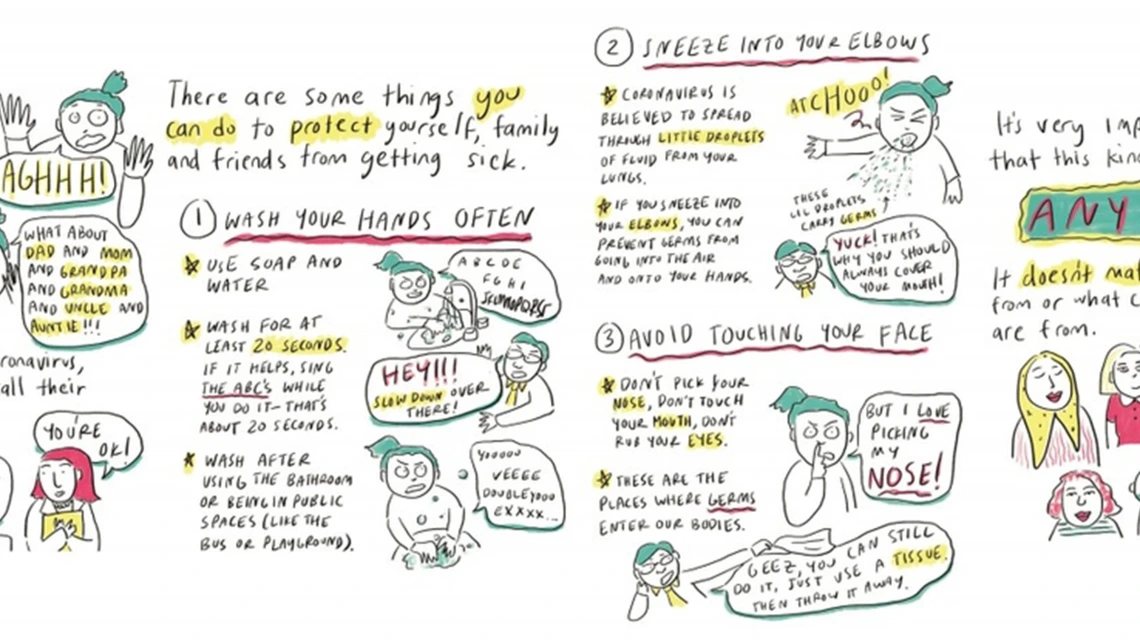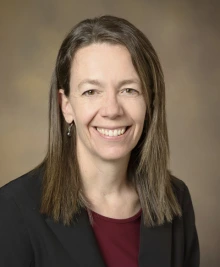Health Sciences Toolkit Helps Parents Explain Coronavirus to Kids
Researchers in the Mel and Enid Zuckerman College of Public Health have created a resource for helping the youngest generation understand the pandemic.

The toolkit for parents includes a comic book to help explain the virus to children.
A team of University of Arizona Health Sciences researchers has created a toolkit for parents, teachers and school administrators to reference before talking to their kids about coronavirus.

Patricia Haynes, PhD, and a team from the Mel and Enid Zuckerman College of Public Health created a toolkit for adults to talk to children about coronavirus.
The initiative was led by stress and sleep expert Patricia Haynes, PhD, an associate professor in the Mel and Enid Zuckerman College of Public Health and clinical psychologist for the Tucson Fire Department. She realized there was a demand for this resource after a conversation with her own daughter.
"My daughter came home with a cold, and she asked if she had coronavirus and if she was going to die," Dr. Haynes said.
For parents, the toolkit offers a kids' comic book exploring coronavirus, stress reduction tips, a step-by-step guide on talking with kids, videos on how to prevent the spread of the virus and information on what to do if you think you might have COVID-19.
"Kids are getting media messages whether or not we're aware, and parents are having a lot of alarming conversations at home with unintentional consequences. I realized we needed a guide to help adults have factual conversations with kids so that they understand what's going on and don't feel scared."
Patricia Haynes, PhD, an associate professor in the Mel and Enid Zuckerman College of Public Health
For teachers, it has resources such as discussion guides for students in kindergarten through fifth grades, a comic strip explaining the virus and more.
School administrators will find preparedness guidelines, considerations for school closures and suggestions for how to handle food during a pandemic, among other resources.
Other faculty, staff and students who helped build the toolkit include Candace Mayer, Dasy Resendiz, Maiya Block, Namoonga Mantina, Alexis Wait, Cody Welty, Joe Russo, Lynn Gerald, Joe Gerald and Velia Nunos, with graphic design from Paul Akmajian at the Center for Rural Health.
The team created many of the resources in the toolkit. Others came from the Centers for Disease Control and Prevention, Substance Abuse and Mental Health Services, the National Association of School Psychologists, National Public Radio and more.
"I'm a teacher and an interventionist, so I knew that one place to find helpful resources might be useful to teachers, as well as community agencies," Dr. Haynes said.
She offered additional suggestions for managing coronavirus communication with children.
"The biggest thing, first of all, is limiting the amount of media, so that coronavirus is not a 24/7 discussion in your house," Dr. Haynes said. "I understand wanting to stay informed, but make sure there's a balance. You don't want your entire day to be focused on coronavirus."
She also stresses balanced and practical thinking about the threat of the virus.
"It's easy to go one way or the other. It's easy to downplay. You might think it's like influenza, but it's also easy to go to the other extreme and think this is the end of the world," Dr. Haynes said. "Try and keep your thoughts more balanced. Acknowledge that this is an unpracticed experience, and it makes sense that we'd feel anxious about what's going on. Tell yourself, 'I make the best decisions I can by paying attention to what is in my control and live by the values that are important to me, like being a good parent or neighbor.'"
Haynes and her team will continue to update the toolkit. One thing she hopes to add is information on how to talk to teenagers.
"I think it's been hard on a lot of teens," she said. During social distancing, they might feel cut off from friends who are such a big part of their lives at this age. It's also easy for teens to overuse media on phones or digital devices. "I would suggest family meetings. If you don't have those, then look for opportunities to have a conversation to connect with teens, maybe focusing on the activities that they enjoy."
This story originated on UA News.

